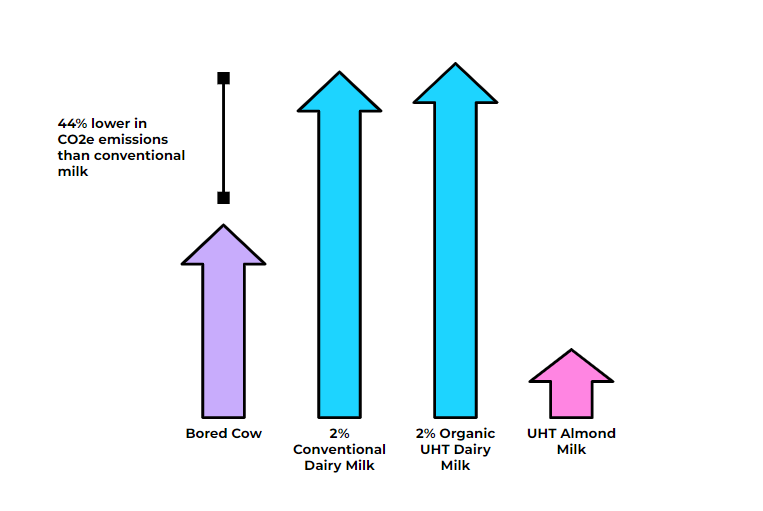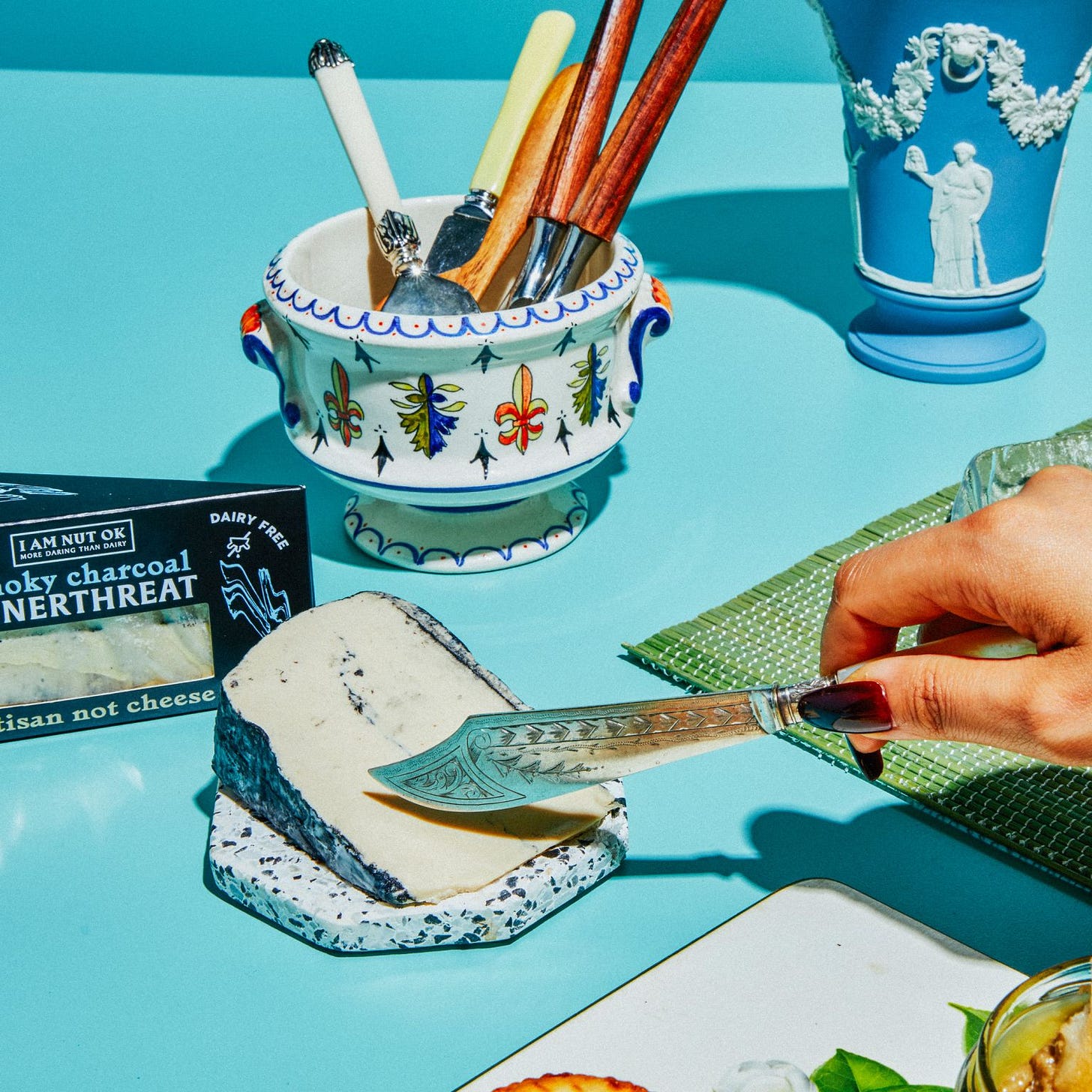🌱 Your Precision Fermentation 101, and inside Bored Cow's perfect whey to partner with Perfect Day.
Featuring Juicy Marbles, Vegan Food Group, EVERY, Impossible Foods and more...
Happy Monday!
This week we cover:
Quick Take: Precision Fermentation 101: The growing future of plant-based products.
Brand Spotlight: Ever tried vegan-friendly dairy? Bored Cow’s perfect whey to partner with Perfect Day.
In case you missed it: 🌱 'More Daring Than Dairy': The cheese brand challenging an industry, and how to get involved in Fairtrade Fortnight.
> Good News Last Week
🎯 Juicy Marbles have launched their plant-based steaks in Tesco around the UK. The launch follows their success in Waitrose where they saw 86% of their stock sold in under four days. Their soy-based steaks closely resemble the beef product with similar marbling and texture.
🎯 Bloom & Wild achieved their B Corp status with an outstanding score of 106.5. The company attributes their score to sourcing flowers from community-focused growers, focusing on carbon reduction and using 100% recyclable or compostable packaging.
⭐️ VFC Foods Ltd announced their rebranding as the Vegan Food Group, which they’re referring to as the “Vegan Unilever”, where majority of profits will be donated to animal charities and diet change initiatives. With VFC, Meatless Farm and Clive’s Purely Plants already under their brand, they’ll be making more strategic acquisitions in 2024 to further expand their reach with a goal to make vegan food accessible to everyone.
⭐️ Sainsbury’s announced they are replacing the plastic packaging of their 13 own-brand mushroom lines with cardboard punnets. This change will reduce 775 tonnes of plastic annually.
⭐️ Marks and Spencer announced the expansion of their ‘Refilled’ scheme to 19 more of their stores. The scheme, in partnership with Reposit | Returnable Packaging Platform, is already available in 6 of their stores. The scheme covers 10 own-brand homecare products which consumers can purchase and upon returning the empty packaging will receive a voucher for future products.
⭐️ Upfield have launched the world’s first plastic-free recyclable tub for their plant-based butters and spreads. This launch comes after four years of R&D and is part of their goal to reduce their plastic content by 80% by 2030.
⭐️ Comax UK announced that they have added Notpla’s food containers to their product range.
> Click on each link to read more.
> Quick Take
Precision Fermentation 101: The growing future of plant-based products.
With Veganuary in full swing, the spotlight is on companies spicing up the plant-based meat alternative landscape. A staggering 33% of the total emissions produced annually are attributed to the food sector. In September 2023, the UK Government’s Climate Change Committee dug into diet change, emphasising the need for dietary adjustments - 20-50% reduction in meat and dairy consumption and a transition to plant-based alternatives - to meet the Sixth Carbon Budget. So many incredible plant-based products are entering the market to make this shift easier. Companies like Juicy Marbles and Newform Foods are creating products that bring both the sizzle and the steak to replicate the taste and texture of meat. One of the processes used to achieve this is precision fermentation. While this may sound more complicated than rearing animals, we wanted to simplify and demystify just what this is.
The scoop on precision fermentation
Fermentation, at its core, utilises microorganisms like fungi, bacteria, and yeasts to convert organic matter into valuable compounds. From pigments to flavour compounds, these products play a critical role in crafting the secret sauce for plant-based alternatives. The microorganisms grown in bioreactors, can be placed on arid land, saving valuable and fertile land for other uses - or simply to preserve it as valuable nature.
Precision fermentation employs carefully selected microorganisms, or in some cases genetically engineered microorganisms, to produce high-value and high-purity compounds. This could aid in achieving food security by producing sustainable sources of protein, other than those from traditional agricultural systems which require more inputs to achieve the same output.
Flavourful Futures Ahead:
While precision fermentation is not new to the food sector, companies like Perfect Day, EVERY and Impossible Foods are pushing boundaries. Perfect Day uses precision fermentation to create a whey protein powder without any animal inputs. Similarly, EVERY is putting the egg before the chicken, producing chicken-free egg proteins that can be used in baking or even alternative meat patties. Lastly, Impossible Foods uses genetically engineered yeasts to produce heme - the molecule responsible for meat’s characteristic flavour. Their first product, the Impossible Burger, uses 75% less water and produces 87% fewer greenhouse gas emissions than a beef burger!
With these pioneering companies at the forefront of precision fermentation in the plant-based sector, we're seeing exciting innovations. As we navigate the evolving landscape of sustainable alternatives and ensure future food security, the potential for precision fermentation to shape the future of food - without compromising on taste - is promising!
> Brand Spotlight
Ever tried vegan-friendly dairy? Bored Cow’s perfect whey to partner with Perfect Day.
Bored Cow, an animal-free dairy milk brand, launched in the US in 2023. As the first brand of Tomorrow Farms, via their line of 'original', vanilla, strawberry and chocolate milks, Bored Cow wants to be the 'vegan friendly dairy' brand that does it all! The team behind Bored Cow set out to answer a question - how can they ensure the beverage so many people enjoy is available for future generations, without factory farming and (importantly) without compromising on taste? Let’s take a look…
Tomorrow Farms partnered with precision fermentation company Perfect Day, developers of a plant-based whey protein which is genetically identical to the whey from cow’s milk (so watch out as it is not suitable for those with milk allergies).
The process involves fermentation with microflora. Bored Cow likens this to a “microbrewery that makes ‘whey’ instead of beer.” The process replicated at Perfect Day is biologically the same as the fermentation taking place within a cow - plant-based ingredients are then added to modify the flavour and texture.
How is this milk putting dairy’s more harmful impacts out to pasture?
Dairy from factory farms comes from cows that are permanently housed indoors in large numbers and in unnatural conditions. Though we don’t know exactly what percentage of UK dairy cows are in factory farms (a 2017 report suggested 20% are “zero-grazed”), it is reported that the figure is as high as 70% in the US. The playful branding of Bored Cow illustrates their mission, to end the need for these practices and leave cows to live a comfortable life. The factory-farmed dairy industry is typically associated with environmental issues such as pollution of waterways, methane emissions, deforestation to make room for more dairy production (an estimated 80% of global deforestation is a result of agricultural production) as well as the social and environmental impacts of milk containing traces of hormones and antibiotics. In New Zealand, which is a large producer of dairy, it is estimated that two thirds of waterways are unswimmable because of pollution from dairy farms. Looking at the effect on our climate, shockingly, the 13 largest dairy companies emit as many GHGs as the entire U.K.
The results are in:
Partnering with Planet FWD, the company can share an LCA measuring how their milk compares to cow’s milk and almond milk on some of these issues:
Cradle-to-gate GHG Emissions: Bored Cow Milk based emissions are up to 44% lower than 2% Conventional Dairy Milk, and up to 45% lower than 2% Organic UHT Dairy Milk. UHT Almond Milk is 67% lower in emissions than Bored Cow, so Almond milk is the champion of this category.
Energy Intensity: Bored Cow Milk is the most energy intensive of the 4 products compared.
Land Use: Bored Cow Milk is the clear winner. Conventional Milk uses 96% more land per kilogram than Bored Cow.
Water Use: Again, first place goes to Bored Cow - they use 58% less water than the Almond Milk, and 67% less than the Conventional Milk.
Cow involvement: none.
The UK is the 13th largest milk producer in the world, worth£4.4 billion in market prices in 2020 having produced 15.3 billion litres of milk. The possible applications of this type of dairy whey are huge. Any product that has cow-based whey proteins in it could follow in the footprints of Bored Cow, partnering with innovative organisations like Perfect Day to lower their GHG emissions, land use and water use (whilst hopefully utilising renewable energy at the same time!). They’re certainly not alone - Bored Cow joins other brands such as General Mills, Mars, Brave Robot, and Coolhaus in working with Perfect Day, and using their animal-free dairy whey. Innovations such as these may potentially offer a chance to struggling dairy farmers to diversify and focus on a combination of new technologies and high welfare farming. WhilstBored Cow isn’t available in the UK just yet, we definitely expect to see them on our shelves soon.
Take a closer look at Bored Cow:

> In case you missed it
🌱 'More Daring Than Dairy': The cheese brand challenging an industry, and how to get involved in Fairtrade Fortnight.
Featuring I AM NUT OK, Karma Drinks, Divine Chocolate, Modern Milkman and more...
> Follow up with…
Article: The Honest Truth: An Interview With A Former Dairy Farm Worker
Article: The A-Z of FoodTech Investment: 30+ Terms You Need To Know
Podcast: Tipping Point: The True Story of "The Limits to Growth"
Course: MBA Skillset: GHG Inventory
👉 Pssst - want to be featured in our ‘Meet the Partners’ series? Reach out here!




